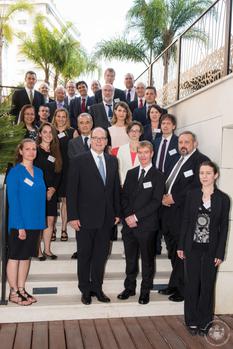- Homepage
- A la Une du Portail
- Antarctica and the Strategic Plan for Biological Diversity 2011-2020: Monaco's Assessment - Gloomy Prospects for Biodiversity in Antarctica
Antarctica and the Strategic Plan for Biological Diversity 2011-2020: Monaco's Assessment - Gloomy Prospects for Biodiversity in Antarctica
An international study, led by scientists from the University of Monash in Melbourne, Australia, undertaken in close collaboration with the Prince's Government, Monaco Scientific Centre Monaco (SCM) and the Scientific Committee on Antarctic Research (SCAR), questions the general view that the Antarctic and the Southern Ocean are in a better state of health than the rest of the world.
This study, published today in the Journal "PLoS Biology," is one of the results of a meeting held in Monaco in 2015, during which a multidisciplinary group of 23 experts carried out the first biodiversity assessment in Antarctica, "Monaco's Assessment." The aim of this meeting was to compare the situation of Antarctic biodiversity and its management with that of the rest of the world.
Examining the extent to which the conservation of biodiversity in the Antarctic and the Southern Ocean meets the set of objectives for the planet is fundamental to halting the loss of global biodiversity.
However, the Aichi Targets of the Strategic Plan for Biodiversity 2011-2020, as defined in the Convention on Biological Diversity (CBD), had never been applied to Antarctica and the Southern Ocean, areas that alone account for approximately 10% of the surface of the planet.
"The results were truly surprising," emphasised Professor Steven Chown, the main author of this study and Director of the Faculty of Biological Sciences at Monash. "While in some areas, such as the management of introduced species, the Antarctic region is doing quite well, in others, such as the management of protected areas and the regulation of bioprospection, it lags far behind," he added.
The study showed that, overall, the difference between the state of biodiversity in Antarctica and the rest of the world was very small, contrary to the image of purity that we have of this remote place.
In this context, the data collected by CSM researchers this year in Adélie Land, in the framework of a partnership with the CNRS and the University of Strasbourg, corroborate this sad fact: "For the second time in the 60 years that we have been present in the Region, we deplore, as in 2014, the total reproductive failure of Adélie penguins on Petrel Island, where the Dumont D'Urvilleresearch station is located. The causes of this mortality remain to be clarified, but they undoubtedly include global and local causes linked to global warming," stated the Scientific Director of the CSM, Professor Denis Allemand.
"Despite this rather pessimistic assessment, there are some great opportunities for positive action," stated Professor Melodie McGeoch of Monash University, the co-author of the article. "The agreements under the Antarctic Treaty System lend themselves to effective action and the States Parties have recently strengthened their commitment to protecting the biodiversity of the region. "
This scientific study ensures that future assessments under the CBD's Strategic Plan for Biodiversity 2011-2020 will be truly comprehensive.
Professor McGeoch said that this study would help inform overall progress towards achieving the United Nations Sustainable Development Goals.
The Prince's Government is pleased to have supported such a study and is delighted to once again be able to welcome biodiversity experts from the Antarctic region to the Principality.
A second workshop, entitled "Antarctica and the Strategic Plan for Biological Diversity 2011-2020: Monaco's Assessment - Implementation Programme," will be held in July 2017 in the Principality, again in association with Monash University, SCAR, the CSM and the Prince's Government.
For full information, contact:
Department of International Relations:
Ms. Céline van Klaveren-Impagliazzo cevanklaveren@gouv.mc
www.gouv.mc
Monaco Scientific Centre:
Dr. Céline Le Bohec cleboheceline@centrescientifique.mc or celine.lebohec@iphc.cnrs.fr www.centrescientifique.mc
*http://journals.plos.org/plosbiology/
Autres actualités du thème

Monaco Yacht Show 2025 : modalités d’accès au Port Hercule pour les embarcations

18th Mondial du Théâtre - The curtain rises on Wednesday 20 August, marking the start of a week-long festival

E-scooters and e-bikes: harmonised regulations to better protect young users







